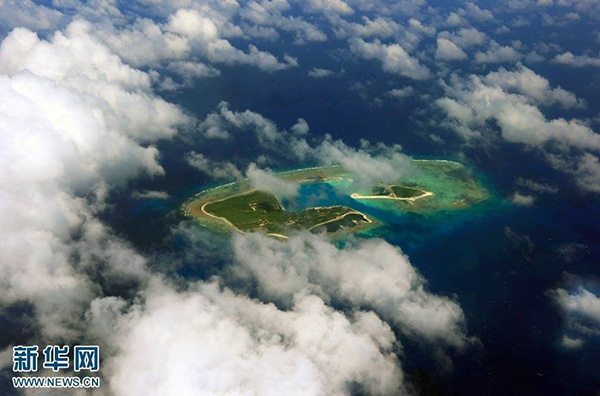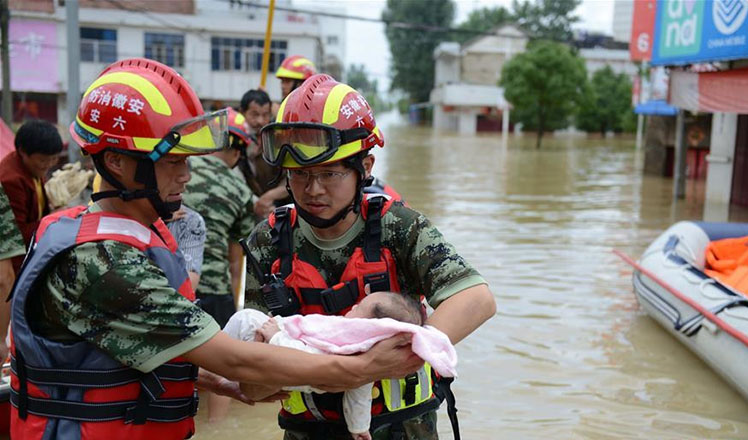Italian expert: China has the right to not participate
Updated: 2016-07-11 14:00
By Tullio Treves(chinadaily.com.cn)
|
||||||||
 |
|
File photo of South China Sea. [Photo/Xinhua] |
Relying on certain clauses of the United Nations Convention on the Law of the Sea of 1982, to which both the Philippines and China are parties, Manila started an arbitration procedure against Beijing. This procedure concerns the status of many features in the South China Sea and the legality of the conduct of China in some incidents that occurred in that sea. The arbitration has resulted in an award handed out on Oct 29, 2015, in which the tribunal affirmed its right to adjudicate (jurisdiction), on about half of the Philippines' submissions, and stated that jurisdiction and the merits are linked on the remaining submissions.
So the tribunal did not exclude to have the right to adjudicate any of Manila's submissions. The final award on the merits will concern all these submissions.
China has made it very clear since the beginning of the procedure that: "It will neither accept nor participate in the arbitration … initiated by the Philippines."
This position has been criticized as inconsistent with the fact that, being bound by UNCLOS, China is also bound by the provisions in UNCLOS providing that a case concerning the interpretation and application the convention may be submitted unilaterally, by one state party, to a court or tribunal, including arbitral tribunals.
As will be shown, in fact, China's position is perfectly legal under international law. The 2015 award of the tribunal does not deny such legality, but it considers China's position only in part.
China's position consists in two distinct statements. The first is that China does not accept the arbitration. The second is that China will not participate in it. The 2015 arbitral award considers in some detail China's non-participation in the arbitration, but treats only cursorily its non-acceptance (or "rejection") of it. Non-acceptance may be seen as a political statement underlining that, with its initiative, the Philippines acts in contradiction with numerous statements, declarations and agreements in favor of friendly negotiations.
Of course, this political meaning is included in China's non-acceptance of the arbitration. However, such non-acceptance has also a specific legal meaning. It conveys the message, that, as stated by China in a Position Paper of December 2014, "the unilateral initiation by the Philippines of the present arbitration constitutes an abuse of the compulsory procedures provided in the Convention".
The tribunal did not consider seriously the "non-acceptance" of the arbitration as distinguished form "non-participation". It simply states that the language used by China "calls to mind" UNCLOS Articles 300 or 294. The tribunal comes to the correct conclusion that these articles are not relevant, but does not pursue its analysis further. In light of the evident aim of the Philippines' submissions to circumvent the limits of compulsory jurisdiction under UNCLOS, the notion of abuse of legal proceedings should have been examined in detail at a very preliminary stage.
It must be regretted that the tribunal did not consider seriously China's "non-acceptance" of, as distinguished from "non-participation" in, the arbitration. Doing so could have brought the tribunal to discuss seriously this very general aspect of the case which is the one China is most keen about, and which explains its non-participation. Such serious examination — whatever its results — would have been necessary in order to ensure the balanced treatment of the parties.
- Arbitral court not best place for South China Sea dispute settlement: Croatian law expert
- South China Sea arbitration to set 'serious, wrong and bad example': Chinese ambassador
- US atlas shows South China Sea islands part of Chinese territory
- Diplomat reaffirms China's South China Sea stance
- Ambassador Liu Xiaoming gives interview to Reuters on the South China Sea
- US focus has shifted from Middle East to the South China Sea
- Cold war mentality lingers in South China Sea arbitration
- China, US need to manage differences over South China Sea: experts
- South China Sea: How we got to this stage
- Dai Bingguo: China not to be intimidated, even if US sends 10 aircraft carriers to South China Sea
- Eid al-Fitr celebrated worldwide
- Swedish PM looking at tightening laws after festival sex attacks
- British PM race cut to 3 hopefuls as 2 contenders exit contest
- Chinese herbalists offer free US treatment
- Obama praises Hillary's judgement hours after FBI's censure
- Rio mayor tells Olympic visitors: 'Don't expect New York or London'

 Griezmann scores twice to lift France into Euro final
Griezmann scores twice to lift France into Euro final
 Life goes on in flooded Wuhan
Life goes on in flooded Wuhan
 Paper cutouts offer a new view of world landmarks
Paper cutouts offer a new view of world landmarks
 Animals occupy Shanghai
Animals occupy Shanghai
 Beijing Muslims mark end of Ramadan
Beijing Muslims mark end of Ramadan
 Remember emerging heroes in China's floods
Remember emerging heroes in China's floods
 Ronaldo powers Portugal into Euro 2016 final
Ronaldo powers Portugal into Euro 2016 final
 Culture Insider: Six things you may not know about Minor Heat
Culture Insider: Six things you may not know about Minor Heat
Most Viewed
Editor's Picks

|

|

|

|

|

|
Today's Top News
Ministry slams US-Korean THAAD deployment
Two police officers shot at protest in Dallas
Abe's blame game reveals his policies failing to get results
Ending wildlife trafficking must be policy priority in Asia
Effects of supply-side reform take time to be seen
Chinese State Councilor Yang Jiechi to meet Kerry
Chinese stocks surge on back of MSCI rumors
Liang avoids jail in shooting death
US Weekly

|

|







